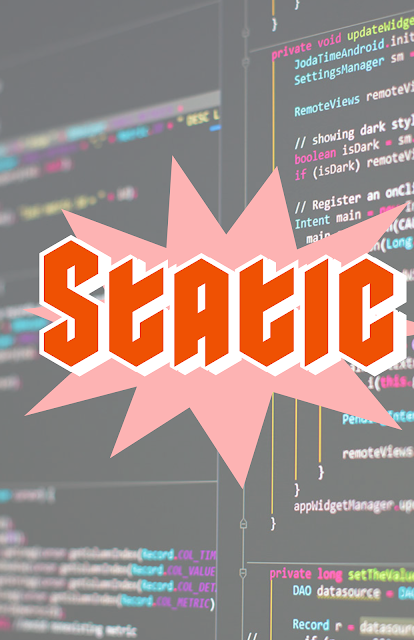In My America... insightful content to migrate conventional history-makers to their personal stance on what an American is today.
Friday, September 22, 2023
How Do You Convert a C# 2-D Array DataType Anyways?
Thursday, June 1, 2023
C# Static As A Data Type
First of all, static to me - is a fuzzy screen of squares that buzz over a screen in an erratic display for abstraction to render difficulty due to the compositional speed of its display.
In C#, static is explained in static modifier - C# Reference | Microsoft Learn as an ability for Classes, Interfaces, Structures by adding a "static" modifier to fields, methods, properties, operators, events, and constructors. (Not with indexers or finalizers.)
So - in the revised version (for my understanding) - I wrestle with this as something that is not an object but can define itself for inclusion of the entire class upon appearance and need. The example in the link provided definition for static used as a counter. I think the parameters set with static include when it can and when it cannot be used. Not sure why yet - and it doesn't state why it cannot be used just anywhere either. The code that is used with the link, also uses it in a down-casting to return after each section has been run. As I continue to learn C# anticipating my next C# course - I am glad I am taking extra measures to pass my courses for career fulfillment for these very particular questions I do not know the answers to yet. (I enjoy documenting these learning flubs to familiarize myself with teaching or interpreting these programming keyword tools and future tool making I may do in my software designs.)
Static being used - I imagine the fuzzy channels that used to be the "in-between" from one channel to the next when that static would appear like a bridging from one to the next. So, using this (TIME) as a means to explain the bigger picture - which is, that all channels are on static, its just, the ones that come in with picture have been produced on specified channels to output where, all channels are technically made of - static.
Is this supposed to be the internet static - where it is also hiding secret data type values as "static" to explain a side-by-side approach to interfacing the space of code here? It is creating a place that can exist with certain rules, that use the space from one element to the next not in size, distance, or any other data type for that matter - and putting static as an explanation for data being written on another unexplainable internet/signal. I like it - but am worried about it also.
If internet in signals (plus all of the code and gadgets and system networks with bells and whistles) cannot be explained as a space of static itself and isolated to channels of code as a modifier for fields, methods, properties, operators, events, and constructors - then it should remain consistent in what this space is called.
Why is there no explanation of code layers and weaving methods that are occurring of content quality to define space as what data types go to what space and have a course on explaining why this computationally is correct because the binary and character data types must match to correlate its boolean match? Decimal to Binary ASCII approved - Where is the course on mapping these abilities of code and why that is needed at that point? (I use weaving here because I envision the ground/soil of interface designs with binary to be what we are mutually in agreement with. What 'weaves' could also mean, what can bring connection by process or function without needing to make a synpasis match - like an actual two of the same thing uniting as one (smh, I don't want this but I know you understood it more than the weaving concept). This is actually pretty dangerous to do, I can't believe computers are still doing - by the way, just straight up connecting to each other.)
One of the difficult parts on learning programming is what to envision. What is internet? What are they writing it on? What is understanding it? This might be ridiculous of me to suggest, but, we're not cutting corners - are we? How do we know for sure?
Using static as a data type, not an object data type, but of itself - requires further explanation for me. I am intrigued at the idea of using this as a canvas approach to use access modifiers as adjectives from a structure there (but not always talked about or used). It's almost like trying to render an image of what internet and programming is by the developer's point of view - by syntax.
Currently seeking an imagery of what I am creating as a Software Developer. Code, creates the language I describe what is being able to move an image into production and the syntax creates the machine language necessary to operate more than image if necessary. What I want from any programming language is the ability to create my [internet] space...
And be able to explain what I am creating and where I am creating it.
The true belief of Zero
2000 A.D. to 2033 A.D. The birth of and the death of a global sacred life will be honored, for the life to death of being remembered after...

-
Religious Studies - The guide to understanding a Calling: structured belief or freedom of religion? Earned Respect - Through a Structured L...
-
Project Guides for Developers using Scrum Guidebook by J. Sutherland & J. McKenna A link to the actual documentation (brief reading tim...
-
Due to limited space at the Oneida Community Education Center on Packerland Drive... We will pick up the meeting time and space next week! ...




